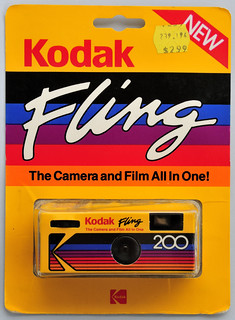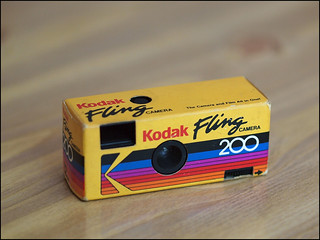Difference between revisions of "Kodak Fling"
m (Layout tidy up.) |
Hanskerensky (talk | contribs) m (Redirected Link URL to archived version) |
||
| Line 7: | Line 7: | ||
|image_rights= wp | |image_rights= wp | ||
}} | }} | ||
| − | While the idea for a [[single-use camera]] was hardly new (one could argue that it dates back to the [[Kodak No. 1 |original 1888 Kodak]]), and the first [[Fujifilm QuickSnap|110 Fujicolor Quick Snap]] reached the Japanese market a year earlier<REF>"Throwaway Cameras," December 1988 Popular Photography (Vol. 95, No. 12; pgs. 54-56; 134).</REF>, the 1987 '''Kodak Fling''' was a landmark in bringing the "disposable" camera to a mass audience. Scarcely larger than the retail boxes [[110 film|110 film cartridges]] were sold in, this [[fixed focus]] camera was a boon for anyone who wanted a few snapshots, but who did not care to own (or had forgotten to pack) a more sophisticated model. The list price was USD $6.95<REF name="KodakHist">[http://www.kodak.com/global/en/consumer/products/techInfo/aa13/aa13pg2.shtml History of Kodak cameras], page 2, from [http://www.kodak.com/ Kodak.com]</REF>, and an unusual feature was the film-advance wheel located on the camera's front. | + | While the idea for a [[single-use camera]] was hardly new (one could argue that it dates back to the [[Kodak No. 1 |original 1888 Kodak]]), and the first [[Fujifilm QuickSnap|110 Fujicolor Quick Snap]] reached the Japanese market a year earlier<REF>"Throwaway Cameras," December 1988 Popular Photography (Vol. 95, No. 12; pgs. 54-56; 134).</REF>, the 1987 '''Kodak Fling''' was a landmark in bringing the "disposable" camera to a mass audience. Scarcely larger than the retail boxes [[110 film|110 film cartridges]] were sold in, this [[fixed focus]] camera was a boon for anyone who wanted a few snapshots, but who did not care to own (or had forgotten to pack) a more sophisticated model. The list price was USD $6.95<REF name="KodakHist">[https://web.archive.org/web/20120415004927/http://www.kodak.com/global/en/consumer/products/techInfo/aa13/aa13pg2.shtml History of Kodak cameras], page 2 (archived), from [http://www.kodak.com/ Kodak.com]</REF>, and an unusual feature was the film-advance wheel located on the camera's front. |
Following this, [[Fuji]] and Kodak, as well as other manufacturers like [[Konica single use cameras | Konica]], proceeded to flood the market with [[35mm film]] variations on the same theme, eventually adding flash, waterproof, and [[Kodak Stretch 35|panoramic]] models to their lineups. Kodak discontinued the orignal Fling in 1989<REF name="KodakHist" />. Due to their very low manufacturing costs, single-use cameras remain one of the few market segments for mass-market film-based cameras which remain viable today (2012). | Following this, [[Fuji]] and Kodak, as well as other manufacturers like [[Konica single use cameras | Konica]], proceeded to flood the market with [[35mm film]] variations on the same theme, eventually adding flash, waterproof, and [[Kodak Stretch 35|panoramic]] models to their lineups. Kodak discontinued the orignal Fling in 1989<REF name="KodakHist" />. Due to their very low manufacturing costs, single-use cameras remain one of the few market segments for mass-market film-based cameras which remain viable today (2012). | ||
Revision as of 05:09, 25 April 2018

|
| Kodak Fling in retail package image by Dirk HR Spennemann (Image rights) |
While the idea for a single-use camera was hardly new (one could argue that it dates back to the original 1888 Kodak), and the first 110 Fujicolor Quick Snap reached the Japanese market a year earlier[1], the 1987 Kodak Fling was a landmark in bringing the "disposable" camera to a mass audience. Scarcely larger than the retail boxes 110 film cartridges were sold in, this fixed focus camera was a boon for anyone who wanted a few snapshots, but who did not care to own (or had forgotten to pack) a more sophisticated model. The list price was USD $6.95[2], and an unusual feature was the film-advance wheel located on the camera's front.
Following this, Fuji and Kodak, as well as other manufacturers like Konica, proceeded to flood the market with 35mm film variations on the same theme, eventually adding flash, waterproof, and panoramic models to their lineups. Kodak discontinued the orignal Fling in 1989[2]. Due to their very low manufacturing costs, single-use cameras remain one of the few market segments for mass-market film-based cameras which remain viable today (2012).

|
| image by Marty4650 (Image rights) |
Notes
- ↑ "Throwaway Cameras," December 1988 Popular Photography (Vol. 95, No. 12; pgs. 54-56; 134).
- ↑ 2.0 2.1 History of Kodak cameras, page 2 (archived), from Kodak.com
Links
- Kodak Fling 110 from Mischa Koning's Kodak Classics
- "Throwaway Cameras", December 1988 Popular Photography (Vol. 95, No. 12; pgs. 54-56; 134), from Google Books